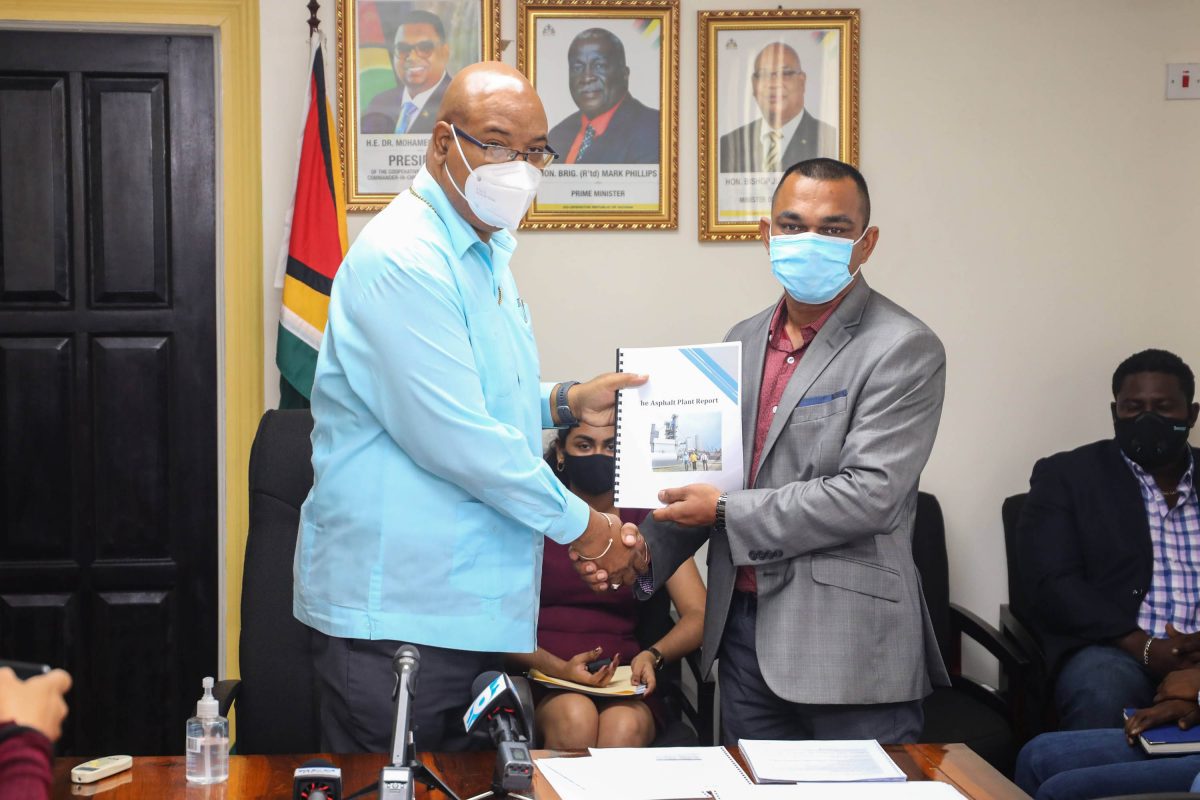Although no substantial evidence emerged from an investigation into alleged financial misconduct at the Demerara Harbour Bridge Corporation’s Asphalt Plant, the probe team says that they found poor internal controls which need to be bolstered in order to prevent the multiple discrepancies that were unearthed.
Following allegations made in a Kaieteur News article, subject Minister Juan Edghill established a team to conduct investigations.
The investigative team, which consisted of Chateram Ramdihal – team leader; Heidi Gillette, Brion Singh, and Dexter Smith, was appointed on October 5th and yesterday handed over their final report to Edghill at the Ministry’s Wight’s Lane location. They were also tasked with examining the systems at the Plant, finding out its reliability and weaknesses which would allow for malpractices to be capitalized on, determining culpability and the appropriate penalty to be meted out to those involved and provide recommendations on a way forward.
After giving a brief summary of the report, Ramdihal stated that they had not found substantial evidence to prove that the allegations that triggered the investigation are true.
Prepayment
“Our investigation revealed that the MoPW purchased asphalt through a prepayment system and did not have a system in place to reconcile the amount of asphalt collected as against that paid for….Our examination of a payment made by the Ministry for asphalt delivered revealed overpayment by the Ministry,” he said. He added that based on the discovery there is a lack of internal controls and also, based on observations made by the team, the allegations made are possible.
“We were unable to determine whether the Ministry received all the asphalt paid for. We were unable to determine whether asphalt sold to other customers was charged to the Ministry’s account”, the report stated, noting that the team was not provided with the relevant information to determine the utilization and balance of the asphalt paid for in advance. The team was also not availed of any reconciliation to indicate tracking of the sum paid for the amount of asphalt collected.
It was recommended that the management of the Ministry put systems in place for a periodic reconciliation to be done to ensure that the amount of asphalt paid for is received and utilised by the Ministry. Management in response said that the Ministry has done so while the team noted that such a system was put in place by 2020.
Additionally, the report revealed that the team’s examination of sample payments made against asphalt delivered for a number of projects revealed an adverse variance of 30.64 tonnes. It was determined that the Ministry overpaid for asphalt by $1,041, 760. However due to the lack of reconciliation and relevant documents, the team was unable to determine whether additional amounts paid for were utilized by the Ministry or whether asphalt supplied to customers were being billed to the Ministry’s account.
The team recommended that the ministry put a system in place to reconcile payment requests with delivery notes to ensure that the amount paid for is the amount received. Management of the ministry says this has been done as of 2020.
Although nothing substantial emerged from the investigation, the report said that the Plant has poor internal controls which contributed to the lack of evidence being found. It was also reported that a number of alarming findings were discovered which led to conclusion that the plant has poor internal controls.
The report, released by the ministry, stated that the team’s review of the overall financial and operational management of the plant for the period 2013 to 2020 revealed that the plant did not maintain adequate documents for the years 2013 and 2014 and this made it difficult to perform any audit work for those years. In response, the management of the plant stated that this observation was not brought to their attention during the exercise and produced copies of the audit reports, noting that input of materials for production for 2014 and subsequent years are not available.
Credit policy
The report also stated that the sale of asphalt was poorly managed as there are no policies governing the sale of goods on credit. It was stated that the lack of a credit policy resulted in all credit sales being approved by the General Manager without any evidence of a credit review process being carried out and credit limits set for the various customers. It was also stated that the plant sold asphalt on credit over the period under investigation. In reply, management stated that they do have a credit policy approval system and that it is an established credit procedure in place which is very active and engaged.
Nevertheless, the team recommended that management should make all efforts to ensure a good credit policy is established before credit is extended to customers.
Ramdihal said it was found that the asphalt from the plant was weighed at the Demerara Harbour Bridge which is located at least ten miles away from the plant. He noted that this procedure exposed the asphalt to a number of risks including the possibility that asphalt could’ve been extracted before it was weighed at the bridge. He stated that when they looked at the cost associated with the weighing of asphalt at the bridge rather than an area closer to the plant, it is their opinion that the cost of weighing at the bridge is far in excess of weighing at the asphalt plant or at a closer area. The team said that the Asphalt Plant should consider purchasing its own transportation.
Management of the plant indicated that this idea was considered, however, due to the Corporation’s inability to retain skilled mechanics to maintain a fleet of trucks it is not advisable to get into this industry.
Additionally, it was revealed that the asphalt plant also began selling cold mix asphalt and the decision to do so was not in keeping with the company’s policy.
“A feasibility study was not done to determine how profitable is this product and we noted that the product was purchased (from) an unknown supplier at that time. The company that the asphalt plant purchased the cold mix from was registered in 2016 and the same year, the cold mix was purchased from the company to go and sell,” Ramdihal said. According to the report the cold mix was purchased from a company in Trinidad and Tobago.
“Management advanced the plant’s funds to a company that was legally non-existent and as such exposed the plant to the risk of non-recourse in the event of non-delivery,” the report stated. Management in response to this finding said that the decision to enter into the sale of cold mix was done after consultation and deliberation with the Ministry of Public Infrastructure’s management. Management explained that the usage of cold mix was not to replace asphalt but as an option for early intervention in the Ministry’s road maintenance (all weather) and in far outlying areas. Additionally, management said that while they are unaware of the incorporation details of this company, there was no loss on the new product, adding that the Cheddi Jagan International Airport, Sol Guyana Inc and the MoPW’s hinterland airports continue to be their customers.
The probe team also discovered that the asphalt plant disposed of scrap metal without going through any bidding process and as such they were unable to determine whether the plant received value for money on that disposal.
“In order to facilitate the construction of the new batch mix plant, all debris and scrap had to be removed. Rather than burying these scraps, a decision was made to earn revenue for the plant”, the report noted.
The team made a number of recommendations to ensure that there are no recurrences of the findings stated in the report.
After receiving the report, Edghill stated that he will summon a special meeting of the Board of Directors of the Demerara Harbour Bridge so that they may deliberate on the findings of the report and take action.









